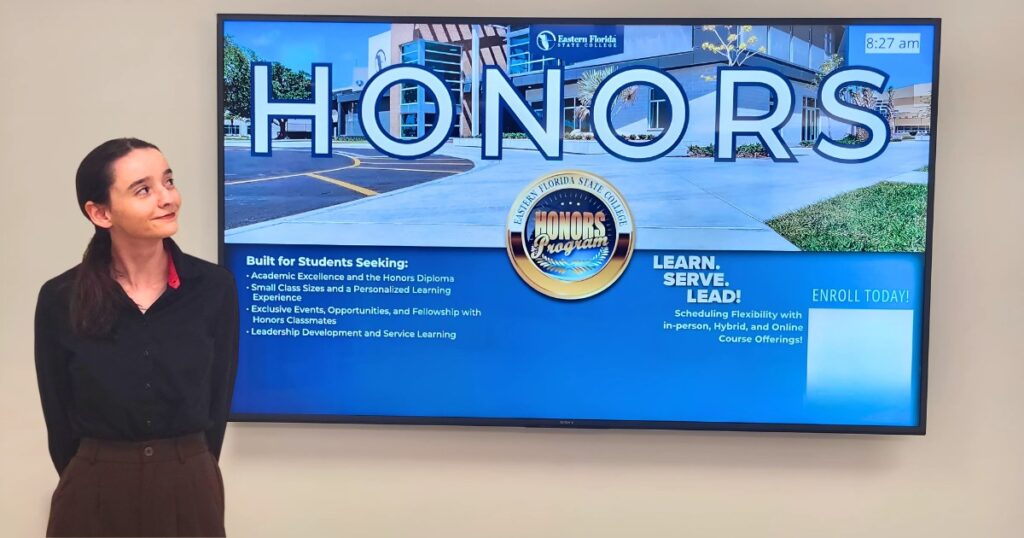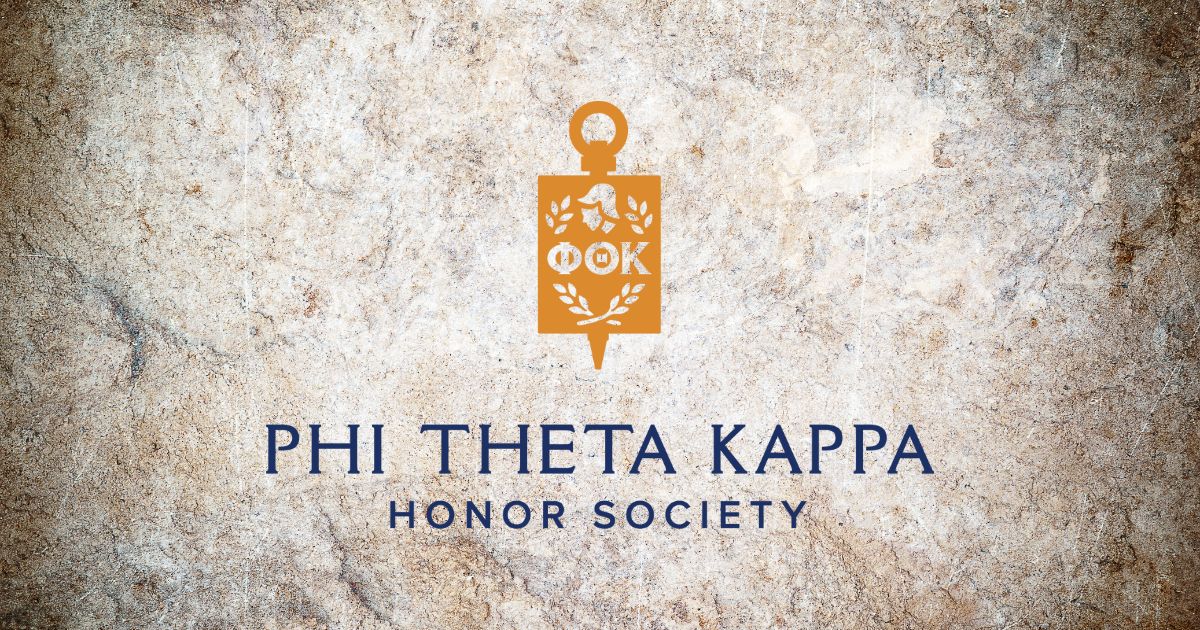At Eastern Florida State College, the Honors Program is helping students like Ashley Bergen achieve big dreams.
“I’m going to be an environmental engineer. I really like space, so originally, I wanted to be an aerospace engineer,” explained Bergen. “But then I became fascinated by how carbon emissions affect the way we see the sky. I really want to help solve environmental problems to make the Earth a better place for everyone, including the animals and plants.”
She’s completing her Associate in Arts degree and a Computer Programming College Credit Certificate (CCC) at EFSC, with plans to transfer to UCF to pursue environmental engineering. Her enrollment in the Honors Program has boosted her confidence.
“Having the extra work is like a good challenge for me. It pushes me to do more. I see myself in my future career, taking on these big tasks. If I can do it now, I know I can do it in the future.”
EFSC’s Honors Program has several options, with various grade point requirements, that all give students the opportunity to take higher-level Honors courses in a smaller classroom setting.
Bergen chose the full honors path in which students must achieve a 3.5 GPA to qualify, then complete 18 Honors credit hours, perform 40 hours of community service, and demonstrate leadership by completing a related course to ultimately graduate with an Honors Diploma and special recognition.
For Bergen, the effort has been well worth it.
“It gives me a competitive edge. It allows me to stand out from the crowd, so I’ll be able to go to the schools that I want and say, ‘Look at the hard work I’ve put in. I’m going to work just as hard at your school!’”
Choosing the Best Honors Program Option
EFSC created the options at a lower GPA so college students with differing goals can experience the same benefits that excite Bergen.
The Honors Affiliate Program requires a 3.2 GPA, with students needing to complete a minimum of 9 Honors credit hours with a minimum grade of “C” and at least one 3-credit (or more) Honors course to be denoted as an Honors Affiliate on their transcript.
The Honors Aspire Program requires a 3.0 GPA, allowing students to benefit from Honors-level work without an intention to graduate with special recognition.
Whether a student enrolls in the Honors, Honors Affiliate, or Honors Aspire Program, every Honors course completed appears on the student’s transcript.
“A lot of students seem scared of joining because they think you have to take so many courses and commit to getting an Honors Diploma at graduation, but you don’t,” Bergen said. “After you apply and get accepted into the program, you get to take Honors courses that interest you. You really get to explore things that you like and that you want to be part of at a higher level.”
Exploring Honors Courses
While a set list of Honors courses exists, Bergen wants students to know that showing interest could lead to more course offerings.
“Students can present their desire for a certain Honors course and get it on the list of requested courses. If a teacher you know ends up wanting to teach that Honors course, they can ask to add it to the Honors Courses list.”
Alternatively, it’s possible for students to request and enroll in Honors-level work while learning in a primarily non-Honors class.
“My English Composition 1 Honors class combined with a regular English Composition 1 class because there weren’t enough Honors students interested at that particular time,” Bergen explained. “I sit in the classroom with non-Honors students. All the course material is pretty much the same, but I have an extra independent project that I complete and present for the Honors credit. You’re still getting your bases — the things you need from that class, the important things — you’re just taking one extra step further.”
Enjoying Honors Program Perks
The perks of the Honors Program go beyond the classroom. Honors students get exclusive access to events like a behind-the-scenes tour of the Melbourne International Airport, which they’re notified about through the Honors Program Canvas course and their Titan emails.
For Bergen, getting to explore these opportunities with peers has helped her feel motivated and connected.
“I’ve met a lot of people through the Honors Program. At the first event I attended, I made a friend around my age, and that was really cool,” she said. “It’s very fun to get to meet other people who are also joining and seeing what classes and career path they’re going to take.”
For bookworms like Bergen, perhaps the best Honors Program perk is being able to check out extra items from the EFSC library.
“You get a little gold sticker for your ID that allows you check out more books at the library than a normal student would.”
Getting a Competitive Edge
Bergen advises students to consider the benefits of taking a single Honors course—even if they don’t wish to fulfill the full Honors Program criteria for an Honors Diploma.
“You still have that one Honors class, and that one class is better than no class because you get the experience. If you decide, ‘Hey, I don’t want to take anymore Honors classes,’ there’s no punishment for not getting the Honors Diploma.”
For students who already have the required GPA, the Honors Program is an opportunity Bergan believes they should take.
“You get a chance to experience something that you probably won’t get to somewhere else.”
Her time in the Honors Program has instilled the importance of being curious, proactive, and willing to try. Her advice to students: “Always ask.”
“A lot of the time, you just have to ask for it,” Bergen elaborated. “I got this interview in the Splash Blog by asking the program chair — and I ended up getting this wonderful opportunity to help promote a program that I’m very passionate about. You’ll never know what’s going to happen if you ask, but if you don’t ask, then you know the answer is ‘no.’ Always ask.”




